Farewell Reg
The
New Year started badly, with the death of Reginald Hill, one of
Britain’s
finest crime writers and someone whom I was proud to know for almost 23
years. The
tributes in newspapers and on line have been fulsome and from the
messages I
have received, they have hopefully inspired a new generation of readers
for the
amazing body of work he left behind.
When
I was first published by the legendary
Collins Crime Club, I had been reading the novels of Reg
Hill (and of Patrick Ruell,
not realising it was Reg
in disguise) for ten years and he was one of my
crime-writing heroes. I was delighted to meet him, and positively
excited that
he seemed delighted to meet me! In fact, I was not special. Reg
was just extremely polite and seemed genuinely delighted to meeteveryone.
And
everyone seemed delighted to meet Reg.
In all my time in the crime writing world – which can be
extremely bitchy
despite what they say about the Romantic Novelists Association - I have
never heard anyone
say a bad word
about Reginald Hill.
His
novels (and some superb short stories)
speak for themselves. I retain fond memories of Reg
as a loyal supporter, an encourager of new talent, a needle sharp
intellect and
a fantastically witty guy who never let a good deed go unthanked.
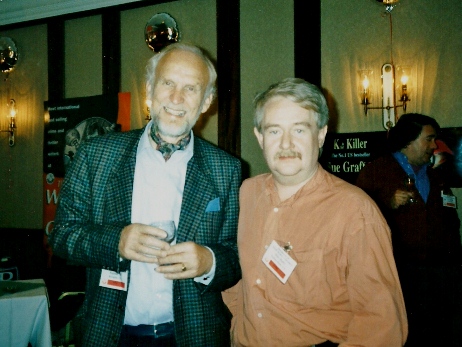
When
I reviewed one of hisbooks, in 2008,
and although he needed neither my praise nor endorsement, he e-mailed
me:
Mike,
I don't care what your friends, family, probation officers ,
police records, and the Archbishop of Canterbury say about you, I think
you're
bloody great. Thanks,
mate! Reg
But
he could be a caring as well as a funny
correspondent. When he (rightly) detected a note of depression in one
of my
letters, his response was immediate:
(You)
sounded as if you were having one of those black dog days which
cock their legs at all of us some time. Boot it away with great
vigour…. keep
at it; don't let the bastards grind you down!
As
always, Reg’s
advice was sound.
*
In
memory of Reg,
Bob Cartwright, one of the founders of Shots
and the original editor of the
printed version A
Shot in the Dark, adds
his own tribute to this column:
Reg
Hill was one of those writers
who once discovered was never forgotten. Read Dalziel
and Pascoe once and you were immediately addicted for life. For ever
after you
would be afflicted by fits of laughter which quickly ascended into
tears. You
could almost certainly guarantee that if you saw anyone on a train
hiding
behind a book with eyes misting over and shoulders heaving with
suppressed
laughter they would be reading one of Reg's
books and
being treated to Big Andy's take on the world.
But
Reg
was also one of the most sophisticated writers of crime
fiction. His own reading was undoubtedly comprehensive and catholic in
the
extreme. You never knew where the inspiration would be found for his
storylines
- Jane Austin in the wonderful Pictures of Perfection, Dante for
Underworld,
which remains my favourite of Reg's
books. And
whatever subject matter he selected, the reader was assured that it
would be
impeccably written. No one, but no one in crime fiction could write as
well as
Reg. If you don't believe me just read the introductory paragraphs of
Pictures
of Perfection. It was saddening in some respects that while he was
rightly
lauded by other crime fiction writers and millions of crime fiction
readers, Reg
was never fully recognised as the great writer he truly
was. If he had not chosen to inhabit the crime fiction backwaters he
would have
been more widely accepted among the mainstream of British literature,
alongside
the likes of Melvin Bragg, Alan Sillito,
Stan
Barstow. That to my mind is a tragedy.
Reg
was also one of
those authors who was
always the subject of kindly
tributes from his fellow crime fiction writers. They could bitch quite
happily
about other writers but never Reg. He was the one they all seemed to
admire. He
was also the most unaffacing
about his own talents
and the most generous towards other writers. Maybe that's why they all
seemed
to like him so much. It
was around 1994 that I found out for myself just
why Reg
was so popular among his peers.
With
more
naivety than sense a few of us more pretentious readers got together
and
inflicted A
Shot in the Dark on the
world of crime fiction. Nominally our intention was to provide a
vehicle for
readers to exchange views on the books and the authors we devoured so
lovingly
and more generally to beef about our perception of the genre as
something that
most publishers would prefer not to sully their hands and reputations
with. But
once we got started we found that our abiding motivation was the joy of
being
able to talk on a regular basis to almost all of the writers we had
previously
only admired from afar. Reg
was right up there at the
top of that list. What was even nicer was the growing appreciation that
several
of those writers actually liked what we were trying to do and gave us
their full
support. Once again Reg
was one of the foremost among
that number. That was Reg. He certainly didn't need for one moment our
fledgling efforts to promote crime fiction. But, unlike some of his
stature
(who shall be nameless) Reg
was ever happy to encourage
our efforts, always responding positively to requests for an article on
the
origins of Big Andy and an interview, even when he could quite
justifiably have
pleaded to other demands on his time. Over the limited lifespan of the
magazine
we got to know and form an attachment to many crime fiction writers.
And there
were a few who we genuinely came to love and admire. Reg
was certainly one of those.
Bob
Cartwright
Cover
Art
It
is early days I know, but the image of choice for 2012 among jacket
designers of
crime fiction seems to be the ‘walking-away man’
– or the man who occasionally
breaks into a run. This is the sort of thing I mean:
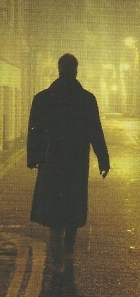


I
have spotted this trend on covers of books
either just out or soon to be published and have noted my mystery man
on: Stav
Sherez’s
A
Dark Redemption,
(though those fabulous Faber people at least add a
walking-away woman to tie in with a major theme of the novel); David
Levien’s
The
Contract (Bantam);
Joseph Finder’s Buried Secrets
(Headline); Philip
Carter’s Altar of Bones (Simon
& Schuster); Barbara Nadel’s Dead of Night
(Headline); Simon Kernick’s
Siege
(Bantam); and the new Jo Nesbo,
Phantom (a
mere 452 pages from Harvill
in March), puts him in a snowscape
to give the requisite chilly Swedish feel.
Of
course there are minor differences and tweakings
– sometimes he wears a traditional trench coat,
others it’s a smart, short car-coat; sometimes he’s
backlit and walking
forwards –
and I suspect we will
see many more variations on the walking man theme before the year is
out.
Screen
Time
I
am told that the first big screen appearance of Stephanie Plum,
possibly
America’s cutest bounty hunter, will be in February when she
will be portrayed by
Katherine Heigl
(whose previous film credits include Bride of Chucky and
Under Siege 2)
in the film of One for the Money.

The
source material for the film is of
course the novel by Janet Evanovich
from 1994, though
her Stephanie Plum series now extends to eighteen books and has
probably made
the author the most successful purveyor of comic crime there has ever
been.
There
will be a slightly longer wait –
until March – for fans of Sophie Hannah who are awaiting the
ITV adaptation of
her excellent (possibly my favourite) chiller
The
Other Half Lives,
but to while away the hours until then, publisher Hodder
have generously provided us with her brand new
psychological thriller, Kind of Cruel.

Americana
Is
it me, or is there an upsurge in the number of American
“rural noir” novels
coming ‘down the pike’ just atthe moment? Tom
Franklin’s Dagger-winning Crooked
Letter, Crooked Letter
(set in Mississippi) may have started the trend
last year, and coming in March from Doubleday is A
Land More Kind than Home
by Wiley Cash, set in the mountains of North Carolina. Then in May, as
I have
already flagged up, we will see Gillian Flynn’s Gone
Girl (Weidenfeld)
which takes place in a small Missouri town.
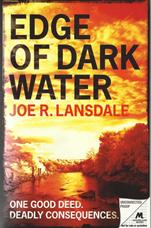 At
the moment though I am greatly enjoying
an advance proof, kindly supplied by those marvellous Mullholland
Books people of
Edge
of Dark Water
by Joe
R. Lansdale, which will be available to the general public on March 15th.
Although set in East Texas, this atmospheric nugget of gothic noir
has a cast, a river and a raft
which all bring to mind a famous tale by Mark Twain. But where the
river to
freedom once led to Cairo (Illinois), in Edge
of Dark Water,
the rafters are
aiming for Hollywood – or anywhere away from their grindingly
poor, bigoted and
ignorant present lives.
At
the moment though I am greatly enjoying
an advance proof, kindly supplied by those marvellous Mullholland
Books people of
Edge
of Dark Water
by Joe
R. Lansdale, which will be available to the general public on March 15th.
Although set in East Texas, this atmospheric nugget of gothic noir
has a cast, a river and a raft
which all bring to mind a famous tale by Mark Twain. But where the
river to
freedom once led to Cairo (Illinois), in Edge
of Dark Water,
the rafters are
aiming for Hollywood – or anywhere away from their grindingly
poor, bigoted and
ignorant present lives.
The
prolific Joe Lansdale (who was first
published more than 30 years ago) found a great champion over here in
the
legendary Murder
One bookshop and I
distinctly remember proprietor Maxim Jakubowski
heartily recommending a trio of titles – Mucho
Mojo, The Two Bear Mambo and
Bad
Chili –
which featured Lansdale’s detective duo Hap and Leonard, in
the
mid-1990s. For a while, I was sure that Lansdale was set to become a
cult
author over here, but then my attention must have wandered for this is
the
first of his books I have read this century.
I
am, however, very grateful to Mulholland
for bringing this new, finely-written tale to my attention and I have
been made
aware that it has also impressed the leading crime fiction critic in
Australia,
so I am not alone in my admiration.
For
readers who prefer their serial killer
fiction to be traditional and American (rather than the present fad for
Scandinavian), then a new name on me is Katia Lief.
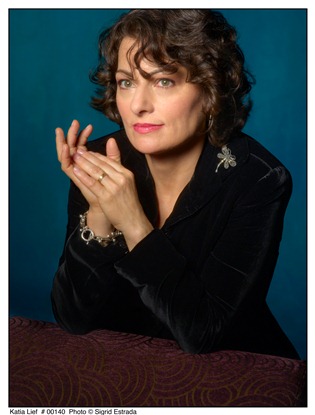
Actually she has three new names on me, for Katia has written novels under her maiden name, Katia Spiegelman,
and under the pen-name Kate Pepper, before plumping for her married name of
Katia Lief,
which is the name on the cover of Five
Days To Die,
just published in the UK by Ebury
Press.
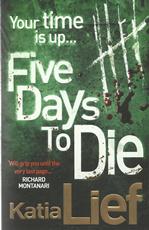
If,
on the other
hand, your taste is for the traditional hard-boiled school, then from
what I
hear I am almost sure I can recommend Choke
Hold by Christa Faust, published here by Titan Books. I
say it is ‘almost
sure’ I can recommend it, because for legal reasons I have
not read it, nor
even actually seen a copy, just heard about it.
My colleague, the vivacious Cathi
Unsworth,
has however and reviewed it in a recent edition
of the Guardian.
It appears that she
quite approved of it, declaring that: “Faust pumps pulp
fiction into
contemporary focus with the acerbic wit of a demonic Dorothy Parker and
the
caustic eye for the human condition of vintage Jim Thompson.”
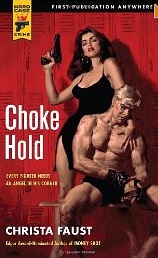
For
those who like their hard-boiled
fiction really hard, X-rated (as we used to say) and for grown-ups
only, then
your main man is
Andrew Vachss;
and his new novel That’s How I Roll is
published by Pantheon in America in March.
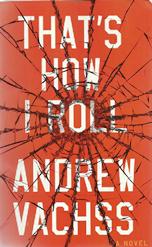
This
is classic, gritty Vachss,
who writes prose you can strike a match on,
as he proved in his 18-book
‘Burke’ series which not only created its
own dystopian universe of urban savagery, but also showed that Vachss
has a crime-writing ‘voice’ as distinct –
and as
important – as those of James Ellroy,
George V.
Higgins and Elmore Leonard. In That’s
How
I Roll
he gives that voice to Esau Till, a top line assassin for hire
who sits on Death Row awaiting the lethal injection and writing his
life story.
But Esau’s not providing a death-cell confession;
he’s intent on looking after
his only family, his brother, even after he’s gone.
M.C.
Beaton’s Recipe for Success
I find it hard to believe that Death of a Kingfisher,
which is
published in March (though for legal reasons I have not seen a copy),
is the twenty-eighth
novel to feature Scottish
cop Hamish Macbeth in Marion Beaton’s delightful series which
began in 1985,
when Robert Carlyle, who played Hamish on the small screen, became an
instant
heart-throb.
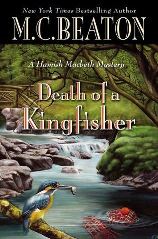
Now
anyone with a basic grasp of arithmetic
will realise that is an output of just over a book a year which, among
crime-writers is not necessarily that prolific. However, if you needed
reminding, the effervescent Marion Beaton (with whom I was delighted to
share a
platform at the 2010 Reading Festival of Crime Writing) has also been
responsible, since 1992, for twenty-two
novels in the popular Agatha Raisin series.
You
do the math.
Redemption
Song
I
really rated The Black Monastery
by Stav Sherez
(crazy name, crazy guy) back in 2010 not just
because it was a good thriller, but because it created a really creepy,
downright spooky, atmosphere in what should have been an idyllic Greek
island
setting.
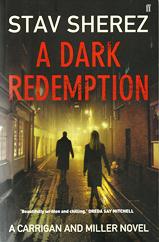
Reading
his new one, from Faber, A
Dark Redemption,
I initially got the feeling that Sherez
had decided to play safe and create a fairly conventional police
detective duo
working a gruesome murder case in traditional police procedural fashion
in a
contemporary London setting – not that modern London
couldn’t do with a decent
fictional detective pairing; it could, and on that score, Sherez
delivers fully, but then he goes one stage further.
Detective
Inspector Jack Carrigan
is the (traditional) maverick detective with the
troubled past and Detective Sergeant Geneva Miller is the new girl on
the copshop block who is put on the case as much to keep an eye on Carrigan
as anything. The case in question is the particularly brutal murder of
a young
Ugandan student with connections to some extreme African
‘liberationists’ and
DI Carrigan
comes with heavy emotional baggage from
an earlier incident in his student youth – in Africa.
So
far, in a good way, so conventional – at
least in crime writing terms; but just before the half-way stage, Sherez
turns down the thermostat and the whole narrative
takes on a distinctly chilly and unsettling air, which is something he
does
very well indeed. To give away any more would be crass (though always
remember
Africa), but I would recommend A Dark Redemption to
anyone looking
for a satisfying policier
which deserves to be the opening shot in a long and successful series.
Time
Machine
The
wonderful thing about crime fiction – well, one of the
wonderful things – is
that it can go back in time and add a healthy chunk of history to the
standard
attributes of plot, suspense, pace and characterisation which appeal to
readers. (I have found it less successful when it attempts to jump
forward in
time in a sort of ‘sci-cri”
fiction.)
The
fashionable setting for historical
mystery, at least this month, seems to be the 1840s and, interestingly
enough,
in both British and American locations.

I
must first mention The Pleasures of Men
by
Kate Williams, which comes with quite stunning cover art (above) from
Penguin;
indeed this trade paperback is a quality production number all round.
Set in
the Spitalfields
area of London (famous among my
generation for having pubs which kept “market
hours”) just as Victoria takes
the throne and with a very vicious killer known as the Man of Crows
on the
rampage, this is a first novel by Dr Williams, an academic who is
something of
an expert on British royalty and Victoriana.
Following
in March will be Lindsay Faye’s The
Gods of Gotham from
Headline Review, which is set in New York City (and
the infamous ‘Five Points’ district) in 1845, just
as New York takes the
momentous decision to establish a police force.
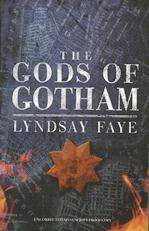
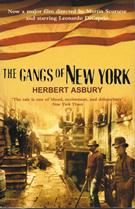
The
Gods of Gotham immediately
brings to mind Herbert Asbury’s classic 1927
“informal history” The
Gangs of New York (subsequently
filmed by Martin Scorsese) and the
early proof edition comes with a ‘Vocabulum’
or
‘Rogue’s Lexicon’ of contemporary
gangland slang from those very mean
Gotham streets.
One
entry might surprise those distinguished
residents of Attleborough
in the county of Norfolk
(which include on occasion the sainted Sir Stephen Fry). It appears
that in
1845 New York, an Attleborough
meant an imitation, or something fake, likely to deceive. It seems the
use of
the word came from the town’s reputation for making jewellery
from base metals
passed-off as precious; something I did not know before now as the
subject has
never come up on the show QI.
Perhaps
it should.
Dirty
Deeds in
Old Peking
It
is some time now since I received a parcel wrapped in newspaper which
did not
explode or require the services of the Health and Sanitation
departments.
However, those perky publishers Penguin have excelled themselves in
their
presentation of advance proofs of Midnight
in Peking by
Paul French,
which they publish in May.
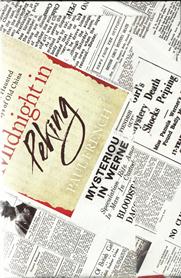
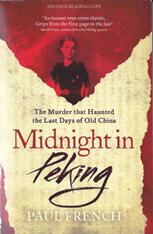
The
proof comes cunningly wrapped in a
clever facsimile page of a broadsheet newspaper where the
‘stories’ are all
authentic (as far as I can see) press cuttings about the murder of
17-year-old
British girl Pamela Werner in Peking in 1937, which is of course the
subject of
the book.
The
author, Paul French is a respected
commentator on and analyst of China, where he has lived for twenty
years.
He sounds like what my old
comrades Dikko
Henderson and Gerry Westerby
might have called ‘an old China hand’ in bygone
days.
Mr
French clearly knows his stuff and don’t
be surprised if Midnight in Peking turns
out to be this year’s Suspicions
of Mr Whicher.
Nordic
News
There
has been much talk in Euroland
of ‘ratings agencies’
lately, but the agencies which rate Scandinavian crime fiction have so
far kept
a low profile. However the firm of Ragnarok,
Odin and
Bluetooth (Berserkers At Law) has recently put out a
three star rating on a film entitled Troll Hunter.
As
with all things flat-packed or
Scandinavian, I look forward to its opening and I am convinced that the
eponymous Inspector Hunter will establish himself as a firm favourite.
Meanwhile,
there are signs that some of the
excesses of recent Scandinavian crime writing have not gone unnoticed.
In a
recent review of Hans Koppel’s She’s
Never Coming Back
in the Independent,
that staunch defender of
this geographical sub-genre Professor Barry Forshaw admits that some
readers of
the book will find it ‘hard to take’ the
“appalling sexual humiliation and
brutalisation of its heroine”.
Yet
the most ardent criticism comes from the
website Crimescene
– a site not usually known for its squeamishness. The object
of Crimescene’s ire,
if not disgust, is Jo Nesbø’s The
Leopard
which the site describes
as a “bloated shock fest of serial killer torture and
mindless splatter” and
goes on to suggest that “fans of films such as Saw, Final Destination and
the charming Hostel series will no doubt love this book.”
But Crimscene’s reviewer is just getting his second wind: “marketeers
try and convince you that Nesbø
is the new Stieg
Larson. This is not true. He is
Thomas Harris with a chainsaw and a tool-kit full of sharpened
screwdrivers.”
Call
me an old cynic (as many do), but I
think Crimescene may
just have put their finger on the
secret of the book’s success.
And
speaking of Professor Forshaw, I find
his name being taken in vain in the Financial
Times, no less. Not by me, I
hasten to add, but by new Swedish
crime-writing superstar Mons Kallentoft,
whose Midwinter
Sacrifice is
currently published by Hodder.
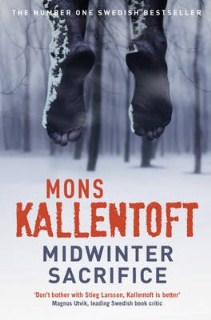
“I
met Barry Forshaw at a dinner for crime
fiction aficionados,” writes Kallentoft.
“Forshaw
came across as humble, intelligent and perceptive.”
Had
I been present at that dinner, I would
have been tempted to demand: Who
are you?
And what have you done with Barry Forshaw?
The
Name’s Iggulden,
Conn Iggulden
I
am looking forward to World Book Day in March and especially to a new
‘Quick
Read’ by historical novelist Conn Iggulden.
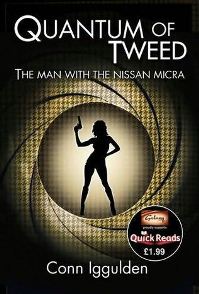
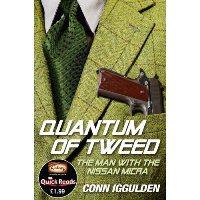
In
something of a departure from the fiction
he is best known for, Mr Iggulden
has penned the
intriguingly titled short thriller Quantum
of Tweed
which for some
reason (possibly legal) seems to have at least two potential cover
designs.
I
have no idea which one will be finally selected, but I think both are
quite
splendid.
What
a Wonderful World (wide web)
The
worldwide interweb
never ceases to amaze me. I was
browsing one of my favourite sites, Tipping
My Fedora (thinking, originally,
that it was Victorian slang for something
completely different) and joined in a ‘blogging’ or
whatever they’re called, on
the subject of the crime novels of E.V. Cunningham from the 1960s. My
more
discerning readers will, naturally, know that ‘E.V.
Cunningham’ was one of the pen-names
of Howard Fast, the prolific American author (of Spartacus
among other best sellers) who was black-listed for many
years for his membership of the Communist Party and who died in 2003
aged 88.
I
happened to mention, in passing, that I
had thoroughly enjoyed Howard Fast’s
1947 historical novel The
Last Frontier which
I had always
believed to have been the basis of the John Ford film Cheyenne Autumn even
though it had gone un-credited.
To
my amazement this provoked an interweb
comment from none other than Mimi Fast, the widow
of Howard, who confirmed my suspicions and said that her late husband
and John
Ford had “long, heated conversations” about the
film’s production but Ford
eventually decided that Cheyenne history was in the public domain and
hecould,
therefore, do more or less what he wanted with it.
How
exciting to have one’s theories – about
a book written over 60 years ago and a film made in 1964 –
confirmed almost instantly
from a distance of at least 3,000 miles. What
a wonderful thing is the jolly old interweb.
What
will they think of next? I am told that you can actually purchase goods
and
services on it somehow. I must see if I can find some more of those
new-fangled
Betamax tapes for my televisual recording device.
Cargo
Challenge
When
that great mystery writer (and Essex Girl) Margery Allingham
died in 1966, she left an incomplete ‘Albert
Campion’ novel, Cargo
of Eagles,
which was completed by her husband Pip Youngman Carter.

On
publication it was said that no one could
‘see the join’ where one writer took over from the
other, but recently I was
told that the distinguished critic and author of the classic The
Moving Toyshop,
Edmund Crispin claimed to be able to tell where Pip
replaced Margery.
Now as I admired
Edmund Crispin both as a crime writer and a reviewer and I love the
Campion
books of Margery Allingham,
I decided to take up the
challenge myself.
On
re-reading Cargo,
I have a feeling
that the (sadly necessary) change in authors came in Chapter 7, though
I would
be delighted to hear from any Allingham
fan with an
alternative theory. Sadly there are no prizes and no
‘correct’ answers as Pip Youngman Carter died in 1969 and Edmund Crispin in 1978.
Awards,
Awards
As
I was saying to my neighbour Lord Julian of Fellowes only the other
day, I am
perplexed as to how the series Downton Abbey is
garnering so many awards. I am not saying it does not deserve them,
simply that
I am surprised that a fly-on-the-wall documentary showing the humdrum
goings on
at a typical, if modest, English country house would have such
international
appeal, especially among our colonial cousins across the Atlantic.

Goodness
knows what the documentary film
makers would make of the daily routines of the upstairs, below stairsand
grounds staff, not to mention the stable-boys, gamekeepers, topiarists,
gardeners, farmhands, maltsters
and brewsters,
who work here at Ripster Hall.
I can only think it would make
terribly dull viewing.
Pip!
Pip!
The
Ripster